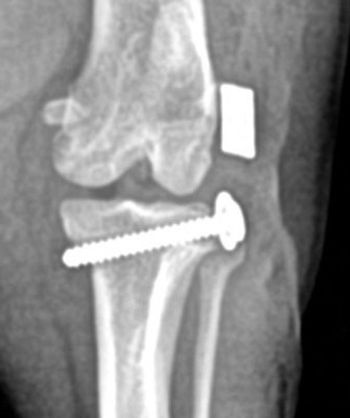
Sometimes an easy diagnosis is hard to deliver
There are some situations in veterinary practice for which no amount of formal education can prepare you.
Informed that I was the fourth vet they'd visited, I hoped they'd give me a hint as to what the other vets had said, but they just stood and stared at me as I watched the horse.
There are some situations in veterinary practice for which no amount of formal education can prepare you. This was one of them.
All I knew about the woman was that she was from San Angelo and that she owned a barrel-racing horse that was lame. I had no idea that I was about to need every ounce of tact I could muster and would still be at a loss for words.
Six people crawled out of the giant dual pickup truck that pulled the brand-new, three-horse slant. I guessed the entire rig had cost at least $70,000.
Here they came — the woman who was the barrel racer, her husband, her sister, her sister's husband and both of her parents.
As I watched them from the back door of the clinic, it was painfully obvious this woman was the boss. It was like watching a military drill as she assigned everyone in her party a task and made sure they completed every detail.
I approached with a handshake and introduction, but she offered only a quick smile and then went directly to the horse's "ailment." It seems the animal was running slower than it had last year.
About a half-second slower, to be exact.
Her "crew" saddled the horse and she climbed aboard, still talking as the horse trotted off.
No one else in the entire group had uttered a single word to that point. They just watched me as I observed the horse's gait. It was as though they were watching my face for any emotion or change of expression, and frankly they were making me nervous. I began to wonder if there was a piece of food lodged in my teeth or something on my chin.
"How long has this critter been lame?" I finally asked.
The brother-in-law spoke up, saying "Ha, that's what we wonder." I had no idea what that meant.
The pressure increased when I couldn't see anything wrong with the horse. I'd watched the lady trot around the parking lot for what seemed like 10 minutes, but that horse had not taken a lame step.
The intensity rose again when the brother-in-law informed me that I was the fourth vet they had visited. I hoped they'd give me a hint as to what the other vets had said, but they just stood and stared at me as I watched the horse.
Not wanting to disappoint them, I finally remarked, "Well, he sure might have a little bone spavin." I figured that was a safe guess, because nearly every barrel horse in the world has some degree of it. It is an arthritis that develops in the hock.
I'd hoped for a reaction other than what I saw — a disgusted look on their faces. "That horse ain't got no bone spavin," muttered the brother-in-law. "If he has any kind of spavin, it's a fanny spavin."
I had no idea what that meant, either. Nine years as a veterinarian and I had never heard of that or read about it in any of the literature. Not wanting to look stupid, I continued to watch the horse trot around the parking lot a bit longer.
I was digging for a way to ask questions and gather clues without appearing to be ill-informed. Finally I asked, " Which leg is it in?" To which the brother-in-law replied, "It ain't in no leg. Tell him what the deal is, Robby." (He's her husband.)
Everyone leaned in as Robby began to explain.
"You see, Dr. Brock, my wife has gained about 20 pounds in the last year or so. We know there's nothing wrong with that horse. It just can't carry the extra weight quite as fast. We heard that you were good at explaining things and hoped you could tell her. None of us has the guts to do it."
What page of my notes from vet school had the answer to this dilemma? My mind went numb and my face turned red.
Two hours these people drove just to put me in this situation. They were all afraid of her, and I was finding myself afraid of her, too. What in the world was this woman going to do when I told her the horse was fine, but she was just too thick? "That's right, big 'un. You lose some tons and this critter will run at least a half-second faster."
I stood there sweating.
Tell me: What would you have done?
Dr. Brock owns the Brock Veterinary Clinic in Lamesa, Texas.
Newsletter
From exam room tips to practice management insights, get trusted veterinary news delivered straight to your inbox—subscribe to dvm360.




